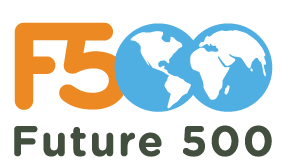What Went Down in Dallas
Our annual Future 500 Summit at EarthX recently wrapped in Dallas, Texas. Here are 14 takeaways, observations, and things that made us go “hmmm….”
Along with the Future 500 Summit, EarthX hosts the world’s largest annual environmental expo at Fair Park in Dallas, Texas.
“Leave your talking points at the door.”
Future 500 Director Kellen Klein facilitates a stakeholder lightning round networking session.
That’s what we ask our guests to do each year when we kick off the Future 500 Summit at EarthX – America’s leading gathering dedicated to effective stakeholder engagement.
Each April, we host the event in Dallas, Texas, on the sidelines of EarthX—which bills itself as the world’s largest annual showcase of environmental solutions. Our intimate, invitation-only summit brings together executives, advocates, investors, and funders for networking and candid peer-to-peer conversations, both on and off the stage.
Delegates speak freely, because they know that no-one is going to call them out on Twitter; we operate the summit under the Chatham House Rule. With fireside chats, panels, networking, and problem solving, participants gleaned insights and forged relationships needed to reduce risk, increase common ground, and advance social purpose.
“This was a terrific, thoughtful discussion between people with very differing views,” one of this year’s participants told us. If you missed out, fear not, we jotted down a few notes for the benefit of those who were unable to join us. (Pro tip: Sign up for our mailing list to learn about next year’s event and other upcoming opportunities to advance business as a force for good.)
If you’re not at the table, you’re on the menu
Future 500 COO Erik Wohlgemuth invites participants to offer their perspectives on the most significant trends in stakeholder engagement.
Whether the subject was NGO campaigning, brands taking stands, or employee activism, conversations inevitably turned to the importance of authentic and proactive engagement. Key insights:
A number of corporate leaders were keen to open up channels with more activist-leaning NGOs, to shine a light on the complexities of private-sector decision making.
Employee activism is on the rise; many participants discussed the recent example in which more than 7,100 Amazon employees, including VPs and directors, called on the company to recommit to climate leadership.
Corporate participants confirmed that their companies plan to significantly deepen engagement on environmental and social issues, such as plastic pollution and diversity and inclusion.
“That’s not my business” doesn’t cut it anymore
With growing stakeholder visibility into global supply chains, any company could find itself in the spotlight of an NGO campaign. How they respond when concern arises will determine the extent to which their brand weathers the storm or thrives through it.
Stakeholders are holding consumer food and beverage companies accountable for the downstream waste and public health impacts resulting from their use of plastic packaging.
Some familiar financial institutions are being asked to disclose environmental, social, and governance risk factors associated with their customers’ activities.
Even business-to-business companies that operate outside the scrutiny of consumer campaigns are fielding calls for greater transparency and accountability.
Companies can no longer brush away issues that happen downstream or upstream of their core business by saying they can only be accountable for their “slice of the pie.” The proliferation of science-based targets and similar efforts inherently require accounting, and accountability, for impacts across the value chain.
Stakeholders increasingly expect companies to help drive broader industry change by participating in pre-competitive collaborations with peers and competitors.
Social + environmental movements are converging
Participants acknowledged the growing linkages between social and environmental issues, and the need to monitor sustainability progress through the lenses of environmental justice and equity.
The Future 500 team would like to extend a big thanks to all who shared their valuable insights at the Summit!
Companies are recognizing the interplay between social and environmental initiatives by embedding their diversity and inclusion officers within broader sustainability departments.
Corporations, NGOs, and grant-making foundations are all working harder to get the “right people in the room,” to ensure diverse perspectives, and explicitly link traditional environmental issues and broader social movements.
A fireside chat dug into a case study on the recent defeat of Initiative 1631, a Washington State carbon fee proposal. NGO participants called the “Yes on I-1631” campaign unprecedented in its diversity, with progressive businesses, tribal communities, religious leaders, and environmental NGOs all in the tent. However, in addition to being overwhelmed by oil-and-gas industry advertising spending, an activist speaker also singled out what they described as inadequate outreach to rural agricultural communities as a contributing factor in the initiative’s failure.
Participants flagged the importance of deep engagement with frontline communities, including communities of color, which disproportionately deal with health and safety impacts of chemical and plastics manufacturing and disposal, the indigenous communities that often rely on, but are also acutely impacted by, oil and gas development and climate change, and the imperative to support rural farmers through the transition to regenerative agriculture.
Participants also highlighted the power of highly grassroots and networked movements such as #MeToo and #Fridays4Future, the Sunrise Movement, and Extinction Rebellion.
The next iteration of the Future 500 Summit at EarthX will unfold in April 2020, in tandem with the 50th anniversary of Earth Day. To apply for an invitation, please tell us a bit about yourself via future500.org/summit. You can view the agenda for our 2019 Summit here.
Future 500 is a non-profit consultancy that builds trust between companies, advocates, investors, and philanthropists to advance business as a force for good. Based in San Francisco, we specialize in stakeholder engagement, sustainability strategy, and responsible communication. From stakeholder mapping to materiality assessments, partnership development to activist engagement, target setting to CSR reporting strategy, we empower our partners with the skills and relationships needed to systemically tackle today's most pressing environmental, social, and governance (ESG) challenges.
Want to learn more? Reach out any time.
More from our blog:














